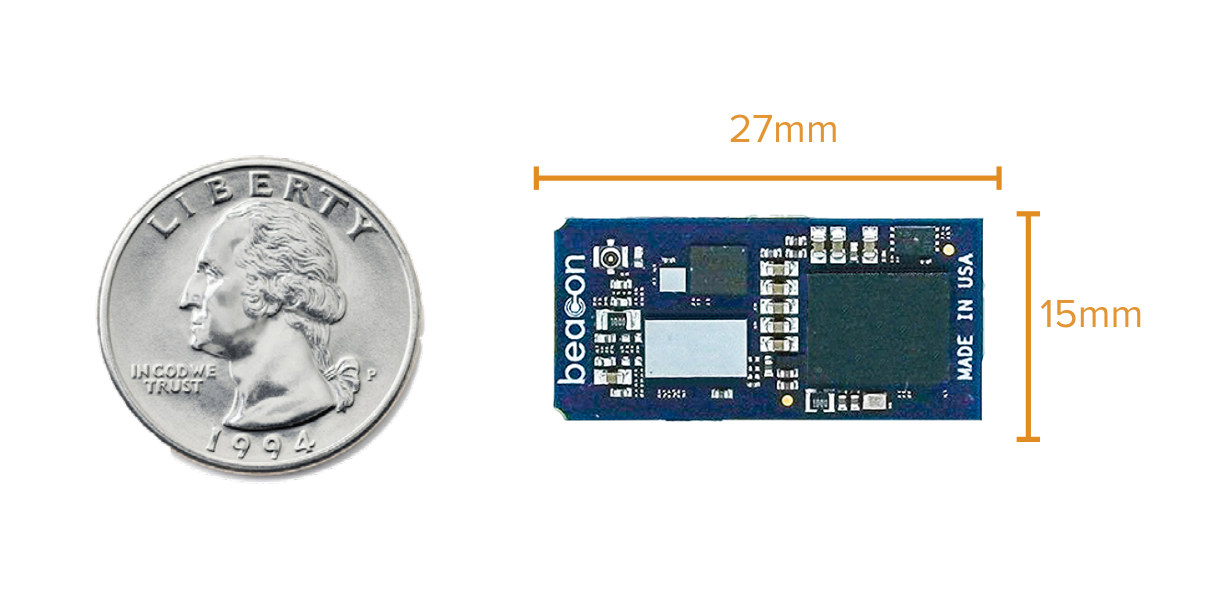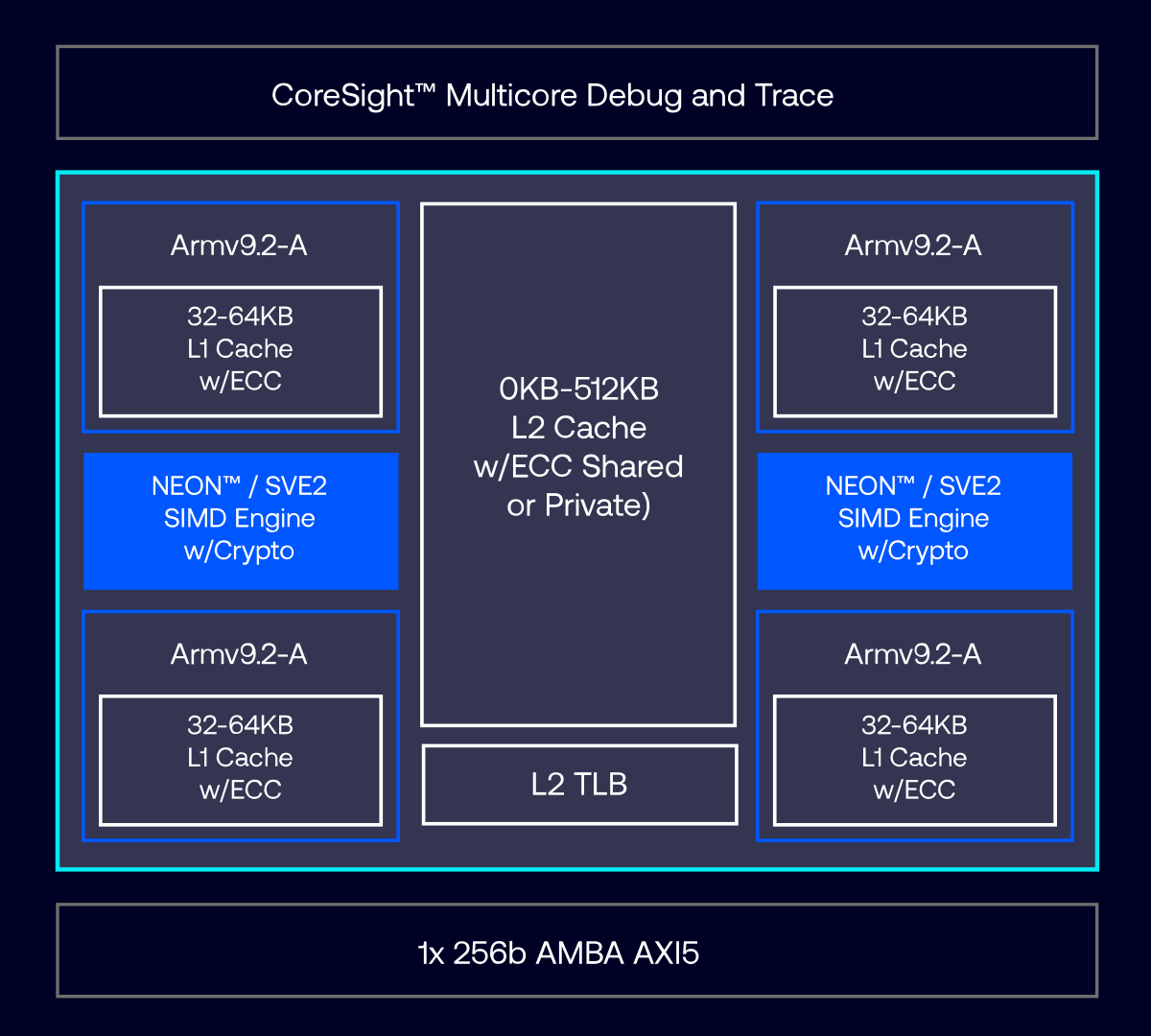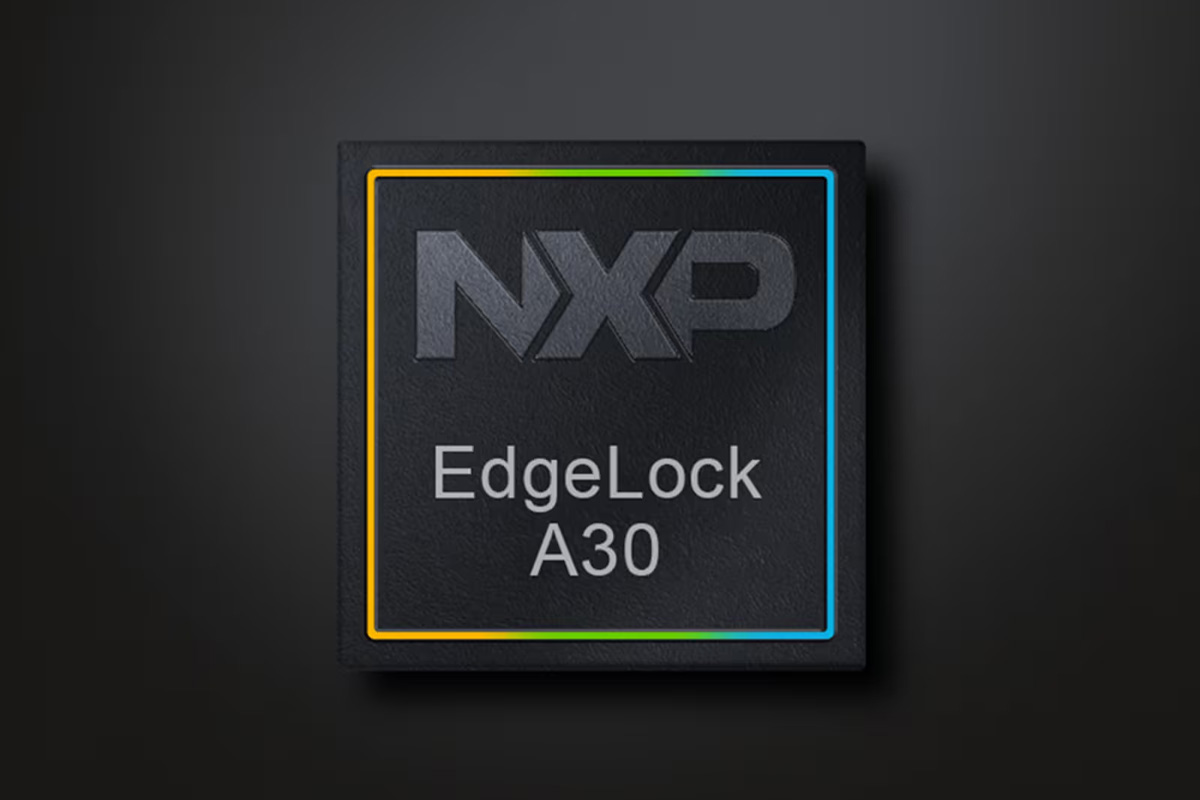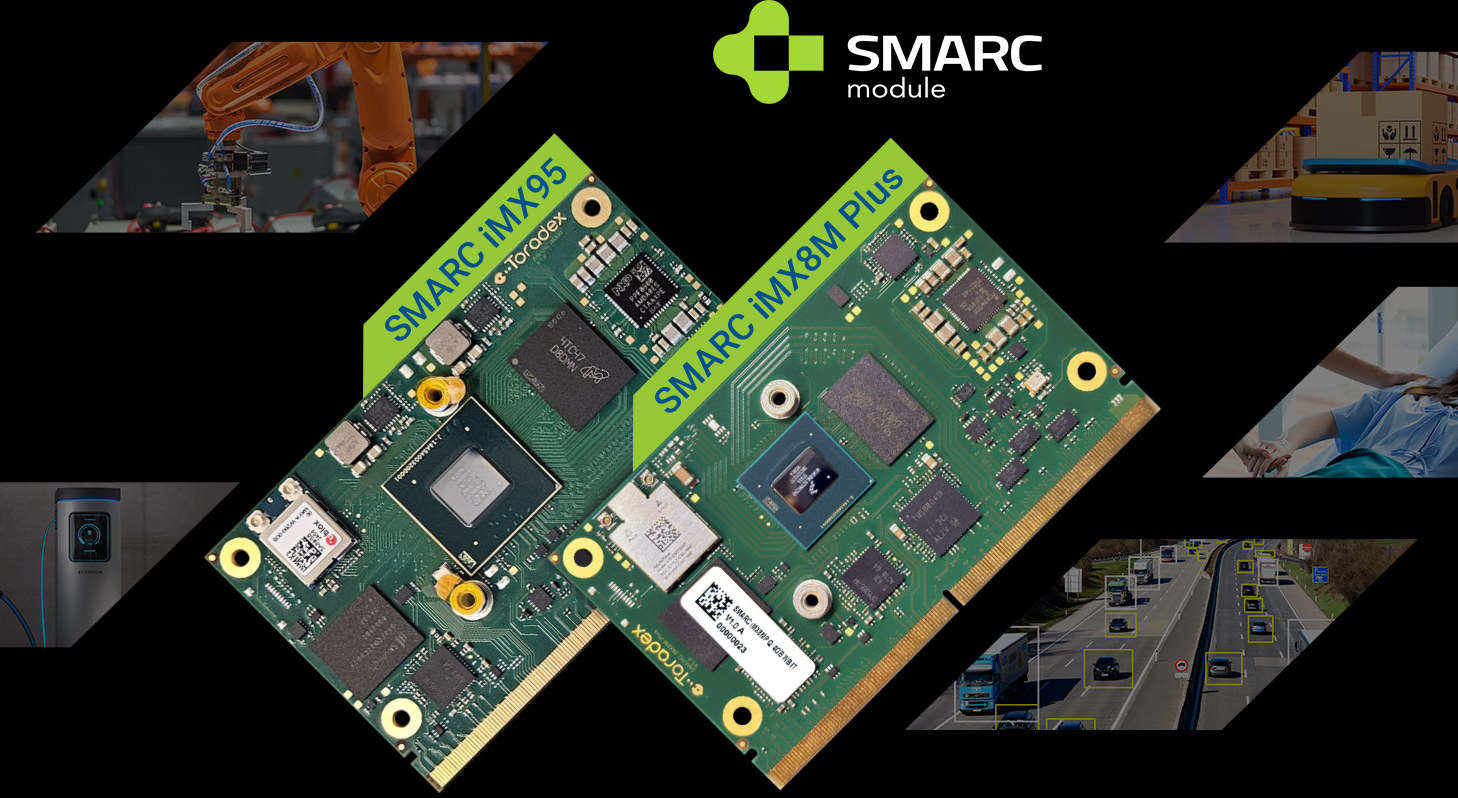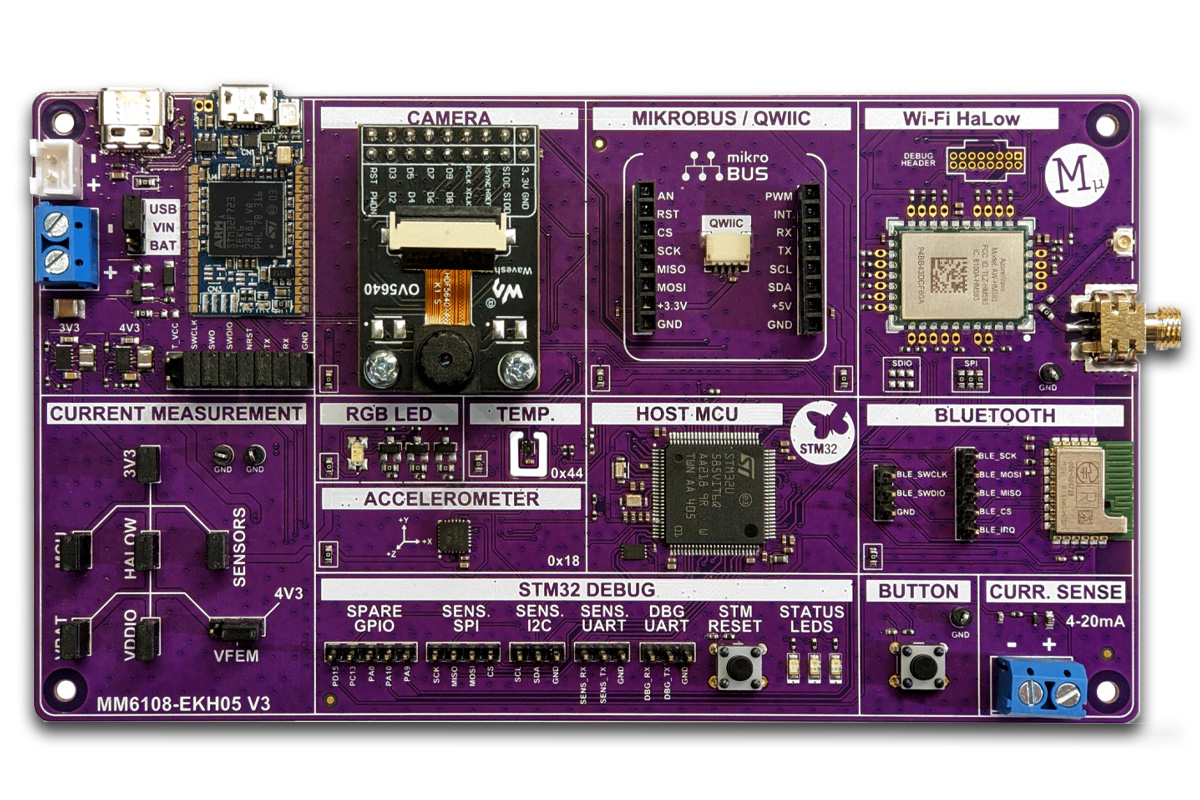Renesas RZ/A3M is an Arm Cortex-A55 microprocessor (MPU) clocked at up to 1.0 GHz with 128MB on-chip DDR3L for cost-effective, yet advanced HMI applications with up to 1280×800 resolution. The RZ/A3M is similar to its predecessor, the Renesas RZ-A3UL, but it integrates 128MB on-chip RAM in a single System-in-Package (SiP), supports both MIPI DSI and parallel display interfaces, and adds a 2D graphics accelerator for smoother user interfaces. Renesas RZ/A3M specifications: CPU – Single-core Arm Cortex-A55 @ up to 1.0 GHz GPU – 2D drawing engine Memory 128KB on-chip SRAM with ECC Built-in 128MB DDR3L-1600 SDRAM (16-bit bus width) Storage SPI Multi I/O Bus Controller× 1 channel (4-bit Double data rate) Boot from Serial NAND or Serial NOR flash SD card host interface Display I/F – 4-lane MIPI DSI or Digital parallel output up to 1280×800 resolution @ 60 Hz Audio – Serial sound interface (SSI/I2S) USB – 1x USB […]
Beacon W5+ SoM – A tiny (27x15mm) Qualcomm Snapdragon W5+ System-on-Module for wearables
Beacon EmbeddedWorks’ W5+ SoM is an ultra-compact (27×15 mm) system-on-module powered by the Qualcomm Snapdragon W5+ platform for wearables with a quad-core Cortex-A53 processor, a co-processor with an Arm Cortex-M55 core and an Ethos U55 ML accelerator, and WiFi 4 and Bluetooth 5.3 connectivity. The Snapdragon W5/W5+ wearables platforms were introduced in the summer of 2022, but so far, all I could find was a $2,000 devkit (TurboX W5+) suitable for ODM/OEM manufacturers. The upcoming Beacon W5+ SoM will be one of the first hardware solutions based on the Snapdragon W5+ platform designed for commercial applications. Beacon W5+ specifications: Platform – Snapragon W5+ SW5100P-0 SoC CPU – Quad-core Cortex-A53 processor @ up to 1.7 GHz GPU – Qualcomm Adreno A702 @ up to 1,010 MHz with OpenGL ES 3.1, Vulkan 1.0, OpenCL 2.0 API support DSP – Dual Qualcomm Hexagon DSP V66K ISP – Dual ISP VPU 1080p30 Video Decode […]
Arm Cortex-A320 low-power CPU is the smallest Armv9 core, optimized for Edge AI and IoT SoCs
Arm Cortex-A320 is a low-power Armv9 CPU core optimized for Edge AI and IoT applications, with up to 50% efficiency improvements over the Cortex-A520 CPU core. It is the smallest Armv9 core unveiled so far. The Armv9 architecture was first introduced in 2021 with a focus on AI and specialized cores, followed by the first Armv9 cores – Cortex-A510, Cortex-A710, Cortex-X2 – unveiled later that year and targeting flagship mobile devices. Since then we’ve seen Armv9 cores on a wider range of smartphones, high-end Armv9 motherboards, and TV boxes, The upcoming Rockchip RK3688 AIoT SoC also features Armv9 but targets high-end applications. The new Arm Cortex-A320 will expand Armv9 usage to a much wider range of IoT devices including power-constrained Edge AI devices. Arm Cortex-A320 highlights: Architecture – Armv9.2-A (Harvard) Extensions Up to Armv8.7 extensions QARMA3 extensions SVE2 extensions Memory Tagging Extensions (MTE) (including Asymmetric MTE) Cryptography extensions RAS extensions […]
NXP EdgeLock A30 Secure Authenticator chip enables battery authentication for compliance with EU regulation 2023/1542
NXP recently launched the EdgeLock A30 Secure Authenticator chip, a Common Criteria EAL 6+ certified secure authentication designed for IoT devices, including battery authentication applications. It complies with the EU’s Batteries Regulation 2023/1542, which mandates the inclusion of a Digital Product Passport (DPP), by 2027 to ensure traceability, sustainability, and safety in battery manufacturing and recycling. Alasdair Ross, Senior Director, NFC IoT Security, NXP explains: Secure authentication helps to ensure brand protection, consumer safety, and product traceability, fostering trust and shielding devices from physical damage. Smaller than a grain of rice, the EdgeLock A30 is designed to fit into even the smallest of devices. It supports multiple authentication use cases, making it easier for developers to support a variety of devices and accessories with a single solution, including device to device, cloud to device, counterfeit protection, and storage or protection of device identity. To address these requirements NXP’s EdgeLock A30 […]
Toradex launches its first SMARC modules with NXP SoCs for improved compatibility and supply chain
Toradex has introduced its first SMARC-compliant system-on-modules (SoMs) with the SMARC iMX8M Plus and SMARC iMX95 SoMs based on NXP i.MX 8M Plus and NXP i.MX 95 SoC respectively. The company has made proprietary system-on-modules for years with the Colibri, Apalis, Aquila, and Verdin families. Those typically are cost-optimized and use most or all I/Os from the selected SoC, but customers are tied to one supplier: Toradex. To offer more flexibility, the company decided to introduce its first standardized system-on-modules by selecting the SMARC 2.2 standard for compatibility with existing SMARC-compliant carrier boards and adding the Swiss company as an alternative supplier. Highlights of the SMARC iMX8M Plus module: SoC – NXP i.MX 8M Plus CPU Quad-core ARM Cortex-A53 application processor @ 1.6 GHz Arm Cortex-M7 real-time core @ 800 MHz GPU – Vivante GC380 2D GPU and GC7000UL 3D GPU VPU – 1080p60 video decoder & encoder AI accelerator […]
Tactility “operating system” for the ESP32 microcontroller family supports built-in and external applications
Tactility is an operating system that runs on the ESP32 microcontroller series. Created by Dutch software developer, Ken Van Hoeylandt (also known as ByteWelder), Tactility is a project one year in the making inspired by the Flipper Zero and its application platform. The ESP32 operating system can run built-in apps and helper services from flash storage as well as external applications from an SD card. It leverages the Espressif ELF(Executable and Linkable Format) loader to load ELF files from external storage to the executable memory area. Tactility is built to run on any ESP32-based device with a touchscreen since drivers (display, touch, and SD card) can be implemented for any hardware. ESP32-S3 devices are “the best option” due to their performance and larger memory. The LILYGO T-Deck series is highly recommended for its onboard keyboard and sizable display. Preset configurations are available for the LILYGO T-Deck Plus, LILYGO T-Deck, M5Stack […]
Murata Type 2FR is the world’s smallest tri-radio IoT module with Wi-Fi 6, Bluetooth 5.4, and Thread connectivity
Murata has recently launched the world’s smallest tri-radio IoT modules, the Type 2FR/2FP series, as well as the Type 2KL/2LL series for hosted solutions. These compact modules feature tri-radio communication, including Wi-Fi 6, Bluetooth 5.4, and Thread, with Matter provisioning for interoperability. The 2FR/2FP series is considered the world’s smallest module (12.0 x 11.0 x 1.5mm) of this type with a built-in MCU, making it ideal for low-cost and highly integrated solutions. It prioritizes security with the latest cybersecurity standards and compatibility with the Matter ecosystem. On the other hand, the 2KL/2LL series is designed to work with high-performance processors running Linux or RTOS. These modules provide reliable tri-radio communication with advanced capabilities. Both series are designed for applications, including smart homes, buildings, industrial automation, healthcare, and more, with features like low-power operation, extended battery life, and reduced component count. Murata Type 2FR/2FP modules specifications: MCU – NXP RW610 or RW612 […]
STM32-powered MM6108-EKH05 Wi-Fi HaLow evaluation kit supports Bluetooth, Camera, and Qwicc/MikroBus modules
Morse Micro has recently launched the MM6108-EKH05 Wi-Fi HaLow Evaluation Kit designed to reduce the development and deployment time of IoT products. Built around the Morse Micro MM6108 HaLow SoC, this kit combines long-range, low-power wireless connectivity with a range of integrated sensors, making it ideal for IoT engineers and developers. Key features include Wi-Fi HaLow connectivity, an STM32U585 Cortex-M33 MCU, integrated sensors (temperature, humidity, accelerometer), 16 MB of SPI Flash memory, programmable GPIOs, power measurement tools, and WPA3 security for reliable and secure communication. The kit also includes alternative power options including USB, battery, or external power, and embeds support for a camera, MikroBus and Qwicc expansion modules, Bluetooth, and current measurement circuitry. All these features make this kit useful for applications including smart homes, industrial automation, and agricultural monitoring. MM6108-EKH05 specifications: MCU – STM32U585 Arm Cortex-M33 microcontroller @ 160 MHz with TrustZone, 2 MB Flash Storage – 16Mbit […]



